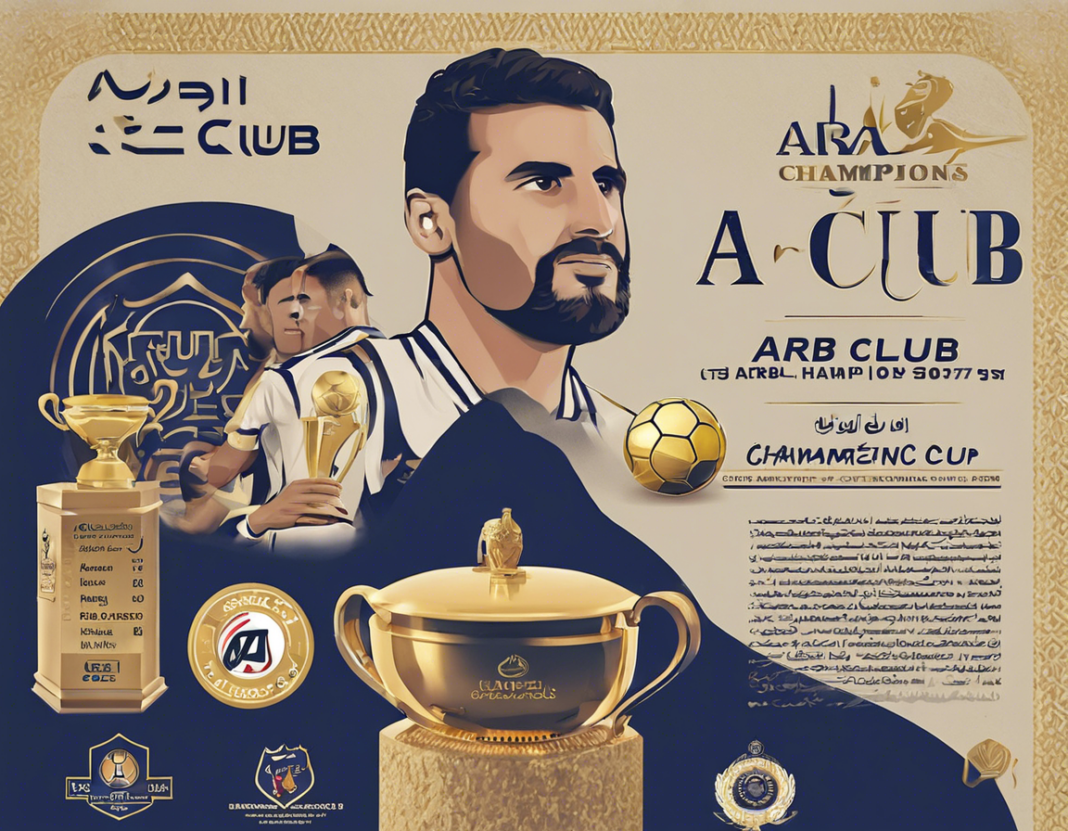Football fans around the world are no strangers to the thrill and excitement of competitive matches that bring together the best clubs from different regions. One such prestigious tournament that has been captivating football enthusiasts in the Arab world for decades is the Arab Club Champions Cup. This annual football competition showcases the talent and skills of top clubs from Arab countries, creating a platform for intense rivalries, memorable moments, and unforgettable victories.
Origins of the Arab Club Champions Cup
The Arab Club Champions Cup, also known as the Arab Club Championship or Arab Champions League, was first established in 1982 by the Union of Arab Football Associations (UAFA). The tournament was created to promote camaraderie and healthy competition among clubs from Arab nations, fostering a sense of unity and solidarity through the shared love of football. Over the years, the competition has grown in stature and popularity, attracting a loyal fan base and showcasing the best of Arab football talent.
Format and Structure
The Arab Club Champions Cup follows a format similar to other continental club competitions, such as the UEFA Champions League. Participating clubs from Arab countries compete in a series of knockout rounds, including qualifying rounds, group stages, knockout stages, and ultimately, the final match. The tournament typically runs from late summer to early spring, with matches played at various stadiums across the participating countries.
Top Contenders and Historic Winners
Several Arab Club Champions Cup tournaments have produced memorable moments and intense battles on the field. Clubs from countries like Egypt, Saudi Arabia, Tunisia, Algeria, and the United Arab Emirates have traditionally been strong contenders for the title. Some of the most successful clubs in the history of the tournament include Al-Ahly (Egypt), Al-Hilal (Saudi Arabia), Esperance Sportive de Tunis (Tunisia), and Raja Casablanca (Morocco).
Key Features of the Tournament
- Intense Rivalries: The Arab Club Champions Cup brings together clubs with long-standing rivalries, fueling intense matches and creating unforgettable moments for fans.
- Showcasing Talent: The tournament serves as a platform for young, upcoming talent to display their skills on a regional stage, catching the eye of scouts and fans alike.
- Cultural Significance: Football is a significant part of Arab culture, and the Arab Club Champions Cup serves as a celebration of the region’s rich footballing heritage and traditions.
- Fan Engagement: The tournament’s popularity among fans is evident in the enthusiastic support shown by supporters who travel across borders to cheer for their favorite clubs.
Future Prospects and Growth
As football continues to evolve and expand globally, the Arab Club Champions Cup is poised to grow in stature and significance. The tournament provides a platform for Arab clubs to compete at an international level, test their skills against top teams from around the world, and showcase the rich footballing talent present in the Arab region. With increased investment, sponsorship, and media coverage, the tournament is expected to reach even greater heights in the coming years, cementing its status as one of the most prestigious football competitions in the Arab world.
Frequently Asked Questions (FAQs)
- Which clubs have won the most Arab Club Champions Cup titles?
-
Clubs like Al-Ahly (Egypt) and ES Tunis (Tunisia) have historically been successful in the tournament, with multiple championship wins to their credit.
-
How are clubs selected to participate in the Arab Club Champions Cup?
-
Clubs from Arab countries are typically selected based on their performance in their respective domestic leagues and qualifying tournaments.
-
Where are the final matches of the Arab Club Champions Cup usually held?
-
The final matches are often held at neutral venues, selected by the organizing committee to ensure fairness and accessibility for fans from all participating countries.
-
Is there a prize money awarded to the winners of the Arab Club Champions Cup?
-
Yes, the winning club receives a prestigious trophy along with a monetary prize that varies from year to year.
-
How can fans watch the Arab Club Champions Cup matches live?
-
Matches are broadcasted on various sports channels and online platforms, allowing fans to follow the tournament from anywhere in the world.
-
Are there any restrictions on foreign players participating in the tournament?
-
The tournament typically follows the regulations set by the UAFA, which may include restrictions on the number of foreign players allowed in each squad.
-
What role does the UAFA play in organizing the Arab Club Champions Cup?
-
The Union of Arab Football Associations (UAFA) is responsible for overseeing the organization, scheduling, and conduct of the tournament, ensuring fair play and adherence to regulations.
-
Are there plans to expand the Arab Club Champions Cup to include more countries in the future?
-
The UAFA has expressed its intentions to expand the tournament and attract more clubs from across the Arab region, promoting greater participation and competition.
-
How do clubs benefit from participating in the Arab Club Champions Cup?
-
Participating clubs gain valuable experience, exposure, and the opportunity to test their skills against top opposition, enhancing their prestige and attracting potential sponsors and investors.
-
What makes the Arab Club Champions Cup different from other continental club competitions?
- The Arab Club Champions Cup showcases the unique footballing cultures, rivalries, and talents specific to the Arab region, providing a platform for clubs to represent their countries on a regional stage.
In conclusion, the Arab Club Champions Cup stands as a testament to the passion, talent, and competitive spirit of football clubs in the Arab world. With its rich history, intense rivalries, and prestigious status, the tournament continues to captivate fans and players alike, serving as a beacon of unity and celebration of the beautiful game in the Arab region. As the tournament evolves and grows in popularity, it will undoubtedly remain a cornerstone of Arab football, inspiring generations of fans and players to come.
